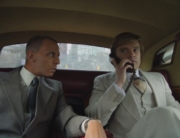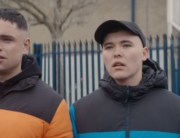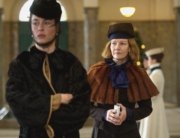You don’t need a particularly good memory to recall the ingredients for a McDonald’s Big Mac, thanks to a certain decades-old, catchy commercial spiel: two all-beef patties, special sauce, lettuce, cheese, pickles, onions, on a sesame seed bun. Now viewers will learn what else goes into the worldwide food franchise’s assembly line—and then some—in this biopic of businessman Roy Kroc, a movie that, like fast food, faithfully follows a recipe.
On the road in the early 1950s Midwest, the dogged Kroc (played by the film’s life force, Michael Keaton) hits up roadside burger drive-ins, hawking a five-spindle milkshake mixing machine. At night in his motel, he listens to an early self-help LP, The Power of the Positive, on his portable record player and recites along with the record what will become the itinerant salesman’s mantra: “Persistence and determination are all powerful.”
Yet he hears more no’s than yes’s, but an order for six mixers for one eatery in sleepy San Bernardino, California, catches his attention. Why does a burger joint named McDonald’s need so many, when he’s lucky to just to make one sell? Scratch that: When he calls McDonald’s from a pay phone (remember it’s a period piece) to confirm, the order is changed to eight. Intrigued, Kroc speeds down Route 66 heading west.
The owners of McDonald’s, brothers Dick (Nick Offerman) and Mac McDonald (John Carroll Lynch), native (or is it naïve?) New Englanders, have through trial and error perfected a formula: a menu centered on hamburgers, served with speed. They are proud to show their new acquaintance, Kroc, the innovations in their thriving kitchen, where the preparation of each burger is timed like a Swiss clock. (David Halberstam’s 1993 nonfiction overview of Eisenhower-era groundbreakers, The Fifties, succinctly featured the emergence of McDonald’s as a global force.)
The mild-mannered brothers have tried to branch out to other locations, but the other eateries failed due to lack of quality control. While Dick and Mac have ideas, Kroc has the showmanship and gumption, and in his pitch to become their franchising agent, he calls upon their sense of patriotism (“Do it for your country, do it for America,” he pleads), and anoints their signature architectural design of two Golden Arches as a signpost that will be universally recognized as “the new American church.” (Kroc’s like a cross between Harold Hill and J.R. Ewing.)
However, there are warning signs: Dick particularly finds many of Roy’s ideas distasteful, and there’s also the matter of temperament. The brothers are cautious, soft-spoken, and reserved to a fault. Meanwhile, Keaton single-handedly propels the film with barely-contained manic energy. He pushes the film forward before it can be stopped in its tracks from the abundant exposition; The Founder serves as a crash course in restaurant management, and a major plot point hinges on whether to make milkshakes from powder. Dick hits it on the nose, comparing Kroc to a “wolf in the henhouse.”
What appears to drive the 50-something Kroc (his “Rosebud,” if you will) when few agree with his visionary plans is revenge—to outwit naysayers, namely, the hometown country club-set, where his latest get-rich gimmick is met with derision at cocktail hour. What quiets the laughter is the reassurance by Roy’s wife Ethel that this time her husband really may be onto something, a nationwide fast-food franchise. This isn’t just another one of his pipe dreams.
Although a movie centered on a burger baron stands apart from other current releases, it needs to be kept in mind that McDonald’s in the 1950s had the same goal as today: predictability. No two burgers are going to be radically different, which also applies to this film and other traitorous tycoons in the movies (for example, Steve Jobs). The message-laden script underlines the conflict between David (the McDonald brothers) and Goliath (Kroc) early on, with little left to build on. Meanwhile, compared to the highly-charged Kroc, the McDonalds are continuously directed by John Lee Hancock as gobsmacked rubes, making you almost root for Kroc to outmaneuver them.
Strangely, for an itinerant salesman, Kroc lives in a leafy suburb of Arlington Heights, Illinois, in a two-story home that wouldn’t be out of place in a Douglas Sirk melodrama—hardly a sign of failure. There, his wife suffers in silence in a painfully thin role, played by Laura Dern, the current go-to patron saint of put-upon nurturers (99 Homes and Wild). Perhaps Ethel represents the presecond-wave generation of women, but once Kroc abruptly dumps her for the wife of a franchise holder, the film moves on as well, leaving Dern in the dust.
With the attention to wheeling and dealing, the film is like the old-school prime time soap Dallas, even though it’s not quite sudsy enough for a potboiler, and because Kroc bulldozes anyone who stands in his way, he remains unchallenged and comes across as beyond nasty. Unlike J.R. Ewing, you don’t love to hate him. Instead, you’re resigned to fate.
As one of McDonald’s competitors used to say, have it your way: rent or stream The Founder for Keaton’s pert performance.







Leave A Comment